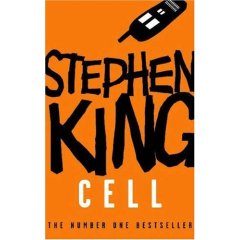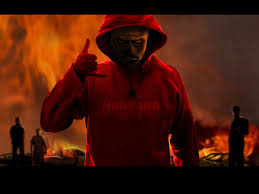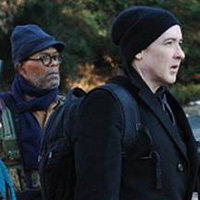My review of Stephen King’s novel Cell got a little long and breathless — much like an SK novel — so I cut it in two. The first part was my experience reading Der Horrormeister and sometimes preferring him as a teacher. Here, I punch the buttons of the fictional Cell, which I found an agreeable and often compelling read.
Here’s the deal on Cell: for reasons that are never fully understood (by characters or by us), everybody speaking on a cellular phone at a fatal moment are slammed by some kind of electronic probe, later called the Pulse, which instantly erases from them most of what we typically think of as individual humanity. They lunge for available throats and entirely forget how to drive or otherwise conduct everyday jobs, let alone the conventions of civilization. Chaos ensues, of course, and life suddenly becomes a savage, primitive contest of survival between “normies” and “phoners”.
We watch as this happens via Clayton Riddell, a young Dad separated from his wife and young son. He’s a struggling artist, and (as did King) he has daylighted as a school teacher, but on the day the world goes violently sideways, he has just sold his graphic novel, Dark Wanderer, and its sequel for a dizzying amount of money. He’s bought a gift for Sharon, estrangement be damned. He’s thinking of what comic book might thrill his little Johnny. Things are looking up. Seems like a good time to buy some ice cream.
Uh-oh. None of this helps at all six pages in, when the power-suited, ear-pieced woman ahead of him in line for soft-serve, yacking loudly, suddenly stops, drops her phone, gazes blankly, and then tries to drag Mister Softee out of his truck. Or when “Pixie Light” (Clay’s mental name for a blonde girl in line behind him), who’d been sharing a pink flip-top phone with her teenaged friend “Pixie Dark”, growls and leaps toward Power Suit to chomp on her carotid artery. Yum. Pixie Dark, who’d only been half listening on PL’s phone, apparently hasn’t taken a direct hit from the Pulse. She retains some fragile connection with what’s left of her mind, but stands confused, terrified and desperately alone. “Who are you?! Who am I?” she wails. Screams and explosions, and veering cars and plummeting jets ensue, and a suddenly deranged human “nature red in tooth and claw” commences to tear jagged holes in the backdrop of a normal day in Boston. And awaaaaaayyy we go!
The young artist Clay was this reader’s hero even before he subdues Pixie Light. (Okay, fine, kills her. He’s stunned by the lurch his world has taken, but not so paralyzed that he can’t use Sharon’s beautiful glass paperweight to cave in the back of the teenaged huntress’s head before she can savage her darker-haired erstwhile companion. We’re definitely in King Territory.) I reluctantly carry an old flip-top communicator myself, and have no reason or wish desire to carry something smarter, but Clayton Riddell goes me one better – he doesn’t even own a cell phone, so he’s not only safe from the Pulse but virtuous, too. Post-millennium, and still no electronic mobile leash!
Now, consider the question, a billion times posed: geezus, where does King get his ideas from?It’s not hard to guess, in the case of Cell. The back-page About the Author has this as its final sentence: “He does not own a cell phone.” Clay, in the ice-cream line, thinks about the behaviour of the people around him – just in the instant before they become the “phone-crazies” at 3:03 p.m. on October 1 – and quietly wonders at how quickly social mores change. “Women in power suits would no more leave home without their cell phones than without their AmEx cards.” And how had braying publicly into a telephone in the midst of other people, Clay thinks, so quickly have gone from being obviously rude to being thoughtlessly common? Clearly, in the early ‘oughts, Mr. King was watching as people fell in love with their hand-held appliances, oblivious to the world around them, and at some point he asked the fatal story-teller’s what if? What if all these people could be hit by some cyber-hacker, somebody keen to see if he could scramble or disable more than just computer brains?
The story’s not all spurting arteries, screams and gore horrific, although there’s quite a lot of that. In the opening pages, hundreds of thousands of people (at least in Boston, where Clay is) have suddenly had their intellectual and cultural hard-drives erased. There are also mixes of fine and cowardly, loving and self-absorbed people – those who were not on the phone when insanity struck – trying to make sense of the sudden loss of all that they held dear or took for granted: routines, safety, predictability, peace, civilization’s whole nine yards. Some idiots go looting with delight, or hot-rodding dangerously, or violently ganging up – not because some Pulse has fried their circuits, but because their civilization’s barely skin deep, and because they CAN. Or maybe they feel there’s just no point to doing better. Easy to be law-abiding, King implies, when everything’s in order and the system’s restraints are in place. But who are we when the lights of civilization go out?
Clay, though, has reason, and reasons to think of something beyond his own survival or instant gratification. He has to get home, back out to small-town Massachusetts. He has to find his boy. He’s joined by the mild, clever loner Tom, and soon by a dazed young woman of 15, Alice, whom they save from a rampaging Phoner. They bond. They decide to stay with Clay, since neither has anyone else to turn to, and at least he has some sense of where he’s going, of what in this wild world to do now.
He becomes his creation. Along with Tom and Alice, Clay turns into a Dark Wanderer himself, since they quickly realize that Phoners are only out and active during the daylight. (Blood lust, but not vampires.) The hero’s quest – to find his family, and protect it – begins. It’s a classic tale, a little reminiscent of the trials of Odysseus trying to get back to Ithaca and his Penelope, but also something of an inversion of Cormac McCarthy’s The Road. In that more critically celebrated novel, a father takes his son in search of sanctuary in a world gone bleak and feral (also for reasons unstated); here, an estranged husband and loving dad tries to get home to his wife – and maybe it’s too late for that, anyway – but most pointedly and painfully to his “Johnny-Gee”.
The closer he gets to home – and unlike Homer’s Odyssey, it’s never clear whether Clay is ever going to get close to what once passed for normal – the more obstacles he faces. The Phoners soon begin to flock, like birds or bats, and later gradually develop some semblance of speech, some weird and unexplained telekinetic abilities, and a spooky communal intelligence. They eventually put forward a haunting figure in a filthy red college hoodie as Clay’s antagonist, the novel’s bogeyman, the “President of Harvard”. The Raggedy Man. He is a compelling creation, and Clay and his fellow travellers can only speculate about what he is. Is he a leader, or merely a symbol of the hive mind, an avatar for the phoner flock’s collective will? What the Raggedy Man does, though, is to communicate with, warn and exile Clay’s team – mysteriously, wordlessly, knowing their thoughts and penetrating their dreams.
Do the phoners have some kind of plan for subduing the normies? How can they be opposed if their networked intelligence can read individual minds? And what the hell is going on at the Northern Counties Expo? Is it a safe haven for normies, a trap, or the final showdown? First with Tom and Alice, later with young Jordan and his beloved private school Headmaster, and later still with another odd survivalist trio, Clay puts one foot in front of the other. He and his friends-under-fire try to understand what has happened and how to respond to it. There are bids to understand human nature, and the nature of evil, and whether the darkness is to be evaded or destroyed. Underlying everything, though, is a father’s search for his son.
Though King has no literary pretensions, he doesn’t get enough credit as a wordsmith. His prose, if you don’t mind the vulgarisms and graphic images, is not only page-turningly effective, but also graceful and evocative. Here’s a fairly randomly chosen bit from late in the novel, which offers a glimpse of the world that Clay has suddenly inherited; by this time, the phoners have found ways to expand their ranks and, in some cases anyway, their individual consciousnesses. This gives the flavour, too, of King’s third-person narration with Clay as its point of view:
“A passing phoner bumped him. It was a man with blood congealing on one side of his face – the first injured refugee from the Northern Counties Expo that he’d seen. He would see more if he didn’t stay ahead of them, so he set off along Route 160, heading south again. He had no real reason to think his kid had gone south, but hoped that some vestige of Johnny’s mind – his old mind – told him home lay in that direction. And it was a direction Clay knew, at least.
“About half a mile south of the feeder road he encountered another phoner, this one a woman, who was pacing rapidly back and forth across the highway like a captain on the foredeck of her ship. She looked around at Clay with such sharp regard that he raised his hands, ready to grapple with her if she attacked him.
“She didn’t. ‘Who fa-Da?’ she asked, and in his mind, quite clearly, he heard: Who fell? Daddy, who fell?
“’I don’t know,’ he said, easing past her. ‘I didn’t see.’
“’Where na?’ she asked, pacing more furiously than ever, and in his mind he heard: Where am I now? This he made no attempt to answer, but in his mind he thought of Pixie Dark asking, Who are you? Who am I?
“Clay walked faster, but not quite fast enough. The pacing woman called after him, chilling him: ‘Who Pih’ Da’?’
“And in his mind, he heard this question echo with chilling clarity. Who is Pixie Dark?”
Who are we when our social structures are torn down? Who is anybody? Here are the human concerns and values that are at the base of King’s alarmist, often-horrible fiction: what could take our mostly lovely, normal and under-appreciated lives and threaten them? Cell, it seems to this occasional visitor to Stephen’s Bogeyman Museum, is vintage and recognizable King. In the earliest, incredible moments as Tom and Clay find each other in the midst of blood-soaked madness, they are already wise-cracking. Their whistle-in-the-dark, joke-so-you-don’t-scream-or-break-wide-open conversational by-play spices and relieves, for them and for us, their grim travels and travails.
Another King characteristic, though the wit and clarity of his dialogue usually helps us to sympathize with his protagonists — and to feel that chilly dread — is that characters too often say unlikely and over-explanatory things. Consider this example, in which wise old Headmaster Ardai, whose school soccer field has been taken over, nightly, by a flock of phoners, answers some of Tom and Clay’s questions:
“’I refuse to believe that we were lunatics and murderers before we were anything else,’ Tom said. ‘Christ, man, what about the Parthenon? What about Michelangelo’s David? What about that plaque on the moon that says, “We came in peace for all mankind”?’
“’That plaque also has Richard Nixon’s name on it,’ Ardai said drily. [Ed. note: Ba-doom sshhh.] ‘A Quaker, but hardly a man of peace. Mr. McCourt – Tom – I have no interest in handing down an indictment of mankind. [Ed. note: Oh, but he does, he does.] If I did, I’d point out that for every Michelangelo there’s a Marquis de Sade, for every Gandhi an Eichmann, for every Martin Luther King an Osama bin Laden. Leave it at this: man has come to dominate the planet thanks to two essential traits. One is intelligence. The other has been the absolute willingness to kill anyone and anything that gets in his way….Mankind’s intelligence finally trumped mankind’s killer instinct, and reason came to rule….[M]ost of us had sublimated the worst in us until the Pulse came along and stripped away everything but that red core.’”
“’Someone let the Tasmanian devil out of its cage,’ Alice murmured.”
The Headmaster administers a strong dose of classical knowledge and philosophy, and then Jordan, his loyal and precocious pre-teen student, fills in the brain science and the technological blanks.
“’Your conscious mind only uses a tiny percentage of your brain’s capacity….Even when you add in the all autonomic functions they control, plus the subconscious stuff – dreams, blink-think, the sex drive, all that jazz – our brains are barely ticking over.’
“’Holmes, you astound me,’ Tom said….
“’If your brain really was a hard drive, the can would be almost empty….Put it this way: the info strip would say something like 2 percent in use, 98 percent available. No one has any real idea what that ninety-eight percent is for, but there’s plenty of potential. Stroke victims, for instance, they sometimes access previously dormant areas of their brains in order to walk and talk again. It’s like their brains wire around the blighted area.’
“’You study this stuff?’ Clay asked.
“’It’s a natural outgrowth of my interest in computers and cybernetics,’ Jordan said, shrugging. ‘Also, I read a lot of cyberpunk science fiction. William Gibson, Bruce Sterling, John Shirley.…Neal Stephenson’s a god.’”
So, yes, a pretty clever kid for 11 or 12, a lot of exposition, and kudos to other writers, too! Do post-millennial kids, no matter how brilliant, say mid-20th-century things like “ticking over” and “all that jazz”? These are small quibbles. King doesn’t need my editorial micro-management, but horror needs its comic relief and calms before storms as much as Shakespeare does – or as much as history does, for that matter. These are pretty big mouthfuls for exhausted survivalists, no matter how smart, and such expository comments can trip us up as they try to make sense out events. However, it is also characteristic of King that, because of the lurking horrors and the pace at which they show up, we don’t begrudge a little telling-time as much as we might.
Other signature moments? There are, as SK-usual, frequent references to pop songs and marketing slogans. There are kids in danger, and as with Jordan, so it often is with King: they are generally often wiser than the adults. They get stuff, in a clear-eyed way that the grown-ups often can’t achieve. We don’t often think of Stephen King and St. Exupery’s The Little Prince in the same paragraph, but both feature young characters or viewpoints that disparage adults for how little they seem to understand, and how egregiously they have messed their various worlds up for generations to follow.
Cell is a horror novel, a post-apocalyptic struggle through the deserts of violence, dismay and hopelessness. But in the end, King is a humane writer. Everything in Cell unfolds from ideas about human nature – frankly, pretty discouraging ones – and what happens when our complacent, unreflective lives are given a sharp and bloody yank. Stephen King is a moral writer, after all, with a macabre way of refusing to look away from his own fears, his personal acquaintance with the fragility and vulnerability of the lives we so blandly take for granted. People who hate King, either because they haven’t read him or they couldn’t get past the vulgarity and the gore, miss the humanity that hums at the core of his imaginative universe.




